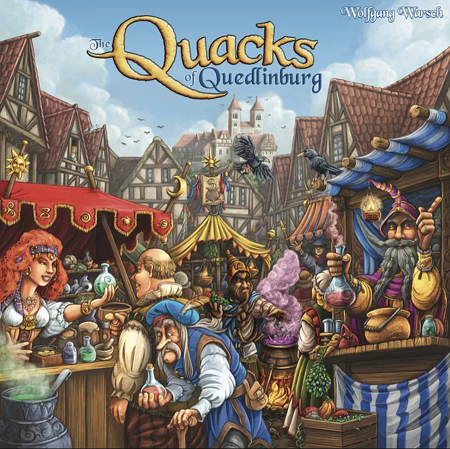Mind Over Matter in a Game of Chance

Last Christmas we got a cool new board game, called “The Quacks of Quedlinburg.” Its theme is brewing potions, and its primary game mechanic is drawing ingredients out of a bag, trying to draw as many as possible to score the most points. But some ingredients, if you draw too many of them, will cause your potion to explode, costing you points. You don’t want that! Tension comes from the fact that you need to keep drawing to get points, but you might go too far, and – BOOM!
Good game design requires some feature like this to generate tension, to keep the game interesting. This particular mechanic, in game design terminology, is called “push your luck,” and it is a pretty reliable way to do it. But there’s another thing about this mechanic that I wanted to bring up: apparently some people have more luck to push than others do. I say that because Aileen wins the game every time we play!
We must have played half a dozen games by now, and every time, when she is drawing her ingredients, they come out in a nice friendly order and she scores a lot of points, whereas I draw the dangerous, exploding ingredients and have to carefully consider whether to keep going (push my luck) or settle for fewer points. I end up falling behind in points, and then complain to Aileen, “this game has no catchup mechanism,” to which she usually replies, “you only say that because you always lose.”
Aileen offers an interesting explanation for the disparity in our luck. She says she does well because she doesn’t care what she draws out of her bag, whereas I am motivated by fear when I draw, and so my anxious energy is affecting my outcome. It’s poisoning the potion, so to speak.
Could this be? Could one’s attitude about a random event actually affect the random outcome? This has been studied scientifically, by the parapsychologist Helmut Schmidt. He conducted experiments on mental influence on the results of random number generators (recorded on computer disk), and found a statistically significant deviation from chance expectancy. What’s fascinating is that an effect is shown even with prerecorded events, providing no one inspects the record before the subject attempts to influence the results.
But how can this happen? An answer lies in the primacy of consciousness model of the universe. In this model, mental reality manifests in parallel with physical reality. Mental objects of experience – thoughts, intentions – are quantum objects just like the physical ones that surround us in the material world. They come into existence in the same way that the physical world does – by the collapse of the quantum wave function by unitive consciousness, which is the fundamental ground of all being.
Going back to my game of Quacks, when I draw from my bag, unitive consciousness simultaneously collapses the wave function of my mental experience (carefree or anxiety-ridden) and the wave function of my physical draw from the bag (favorable or unfavorable by the game rules). In my individual ego-consciousness, I experience either exultation at a fortuitous draw or frustration at an unfortuitous one.
But the quantum dynamics of my mental experience – the meaning ascribed by my mind to the outcome of the random draw – is tangled up with the quantum dynamics of the physical draw itself. By worrying about a bad draw, I am skewing the probability distribution of the physical event. My expectation is biasing the result! That is how this is a case of “mind over matter.” I need to learn to be chill when I’m drawing my potion ingredients, to open my mind up to more possibilities.
This model even explains Schmidt’s strange finding that mental influence can affect an already recorded (but not observed) random number generation. The collapse of the wave function (“state vector” as the experimenter puts it) occurs in the moment of conscious observation, and no sooner, as implied by the famous double slit experiment. In other words, until the record on the computer disk is observed, its state is undetermined, just like that of Schrödinger’s cat.
You might not give much credence to the work of Helmut Schmidt, since he was a “parapsychologist,” a field which is generally considered to be pseudoscience. But haven’t you ever been playing a game with dice rolling and experienced the right number (or wrong number) come up just when you needed it (or dreaded it) the most? Maybe in a table top roleplaying game, where the story meaning is particularly entwined with the dice outcomes, where the fate of a beloved character hinges on a critical hit or miss, or on making or failing a saving throw. I know I’ve experienced it.
I’m sure we’ll play Quacks again, and I will try to release my fear and let the flow of good luck come to me. But I will have to fight my own nature. My competitive edge and my ego-identification with the outcome of random draws from a bag is what tangles me up, even though there are no real stakes in the game other than whether or not we’re having fun.
Where do I get this stuff? If you’re interested in learning more about primacy of consciousness as a model of reality, a good place to start is the book “The Self-Aware Universe” by Amit Goswami.
3 thoughts on “Mind Over Matter in a Game of Chance”
No “catchup mechanism”? Rat tails!!
Yeah, Aileen will always say “you with your rat tails,” but I don’t find that they work very well as a catchup mechanism.